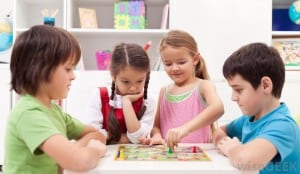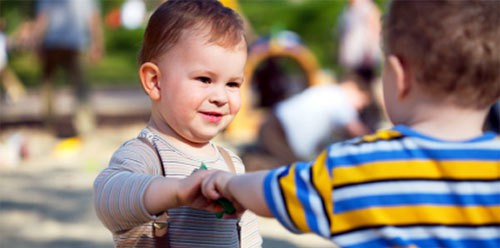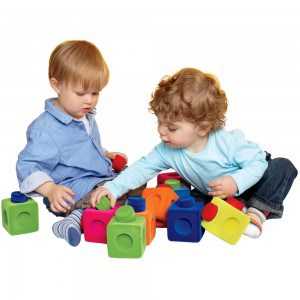How to Make Friends at Daycare or Preschool: Strategies for Your Child
First, recognize the different stages of play and at which ages they occur. If your child is not making friends yet, it may simply be because he is not old enough to play with others in an interactive way. Many infants and toddlers begin with solitary play. This is when a child plays on her own with a toy, without paying attention to what the children around her are doing. Around the age of 2, many children will engage in onlooker play, in which a child might play on his own, while observing the children playing around him. This type of play may lead to parallel play, in which two children may mimic one another, playing with similar toys in a similar manner, but not interacting. At around 3-4 years of age, children will begin associative play, in which they play together, but their play is disorganized and unplanned. And between the ages of 4 and 5, children will begin cooperative play, in which children play games with rules, roles for certain children, and a degree of organization.
Once a child begins to play with other children his age, work with him on the social skills he’ll need in order to get along with others. Teaching your child how to share her toys, cooperate with others in a group setting, help other children who have misplaced a toy or cannot figure out a game, and keep anger and frustration in check, will allow them to make friends more easily. Your child’s teachers at Summit Kids Academy will be working on these skills at school, but you’ll want to reinforce this type of social behavior at home.
You can also model good social behavior for your child at home. When you are reasonable in conversations with your partner, relatives, and children, your kids will mimic your behavior. Remember to be polite, help others, cooperate, and reward the people around you for doing so, and your child will pick up more than you may think!
And remember that a range of different types of friendships exist, and not all children’s circles of friends are alike. Some children will develop a very close friendship with one other child. Others will have a more loosely knit circle of friends, without intense attachment. Your child may just have a preference for a certain kind of friendship, just as adults do.

If your child has ADHD, a learning disability or behavioral disorder, or is simply a bit shy, talk to your daycare or preschool provider about helping her to make friends. Kids who exhibit behavior that other children may deem “strange” may have trouble fitting in. It is important to help your child understand how her behavior affects the children around her, and help her to manage any trouble she may be having in her personal interactions. But as a group, kids must also learn to accept that some children may exhibit different behavior from others, and that this does not give them permission to bully or alienate those children.
It takes the involvement of kids, parents, and teachers to help each child to learn ways in which to socialize, and to help entire groups of children to be accepting, cooperative, and kind. Talk to us about how you can work together to make play and friendship a healthy experience for your child and those around him.
Summit Kids Academy
Lake Worth, Florida


